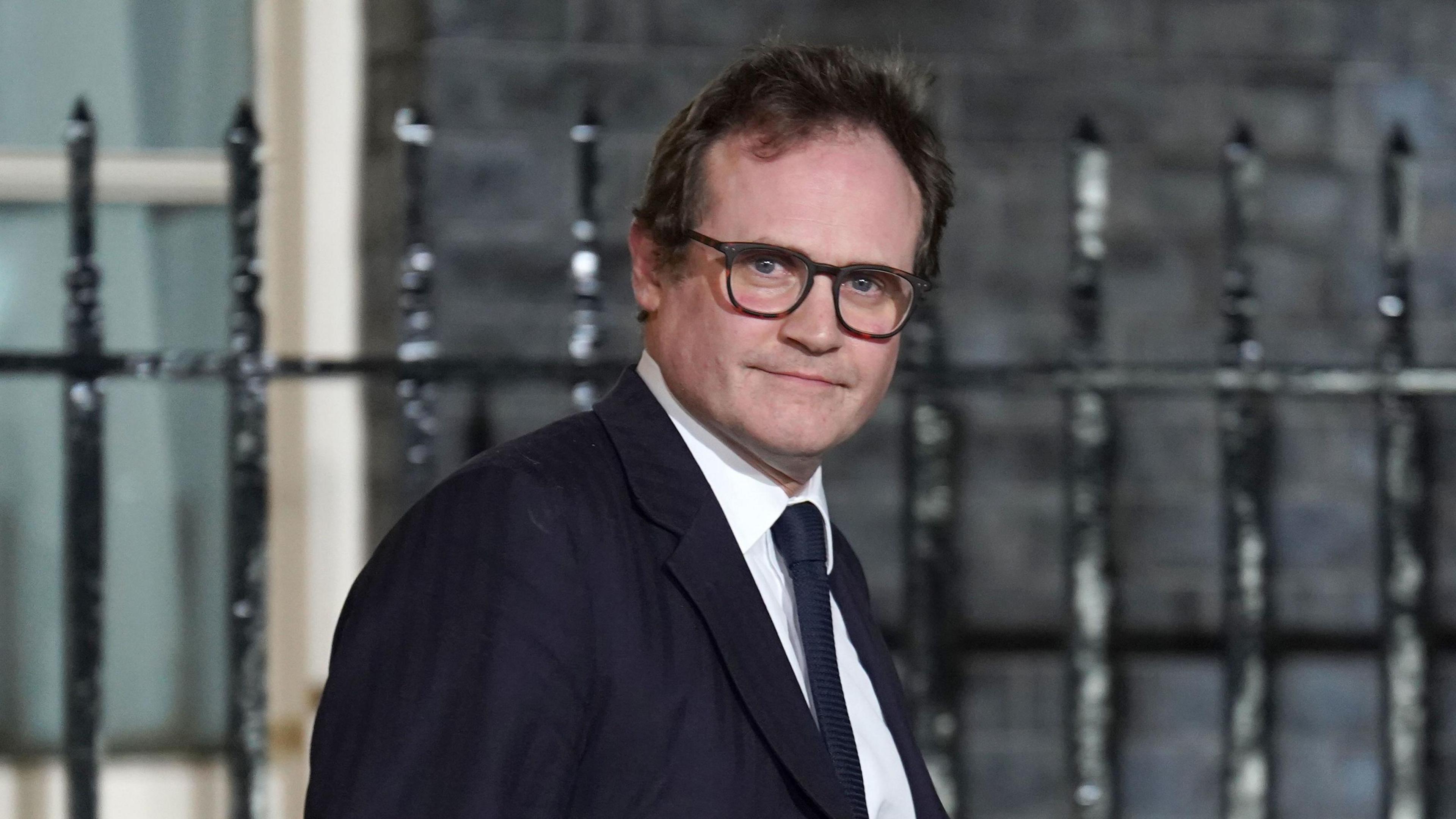Tugendhat joins race to be next Conservative leader

- Published
Former security minister Tom Tugendhat has announced his bid to become the next Conservative leader, accusing the party of "failing to deliver" on its promises.
Writing in the Daily Telegraph, he said he was “not just running to be the next Conservative leader", but also to become the "next Conservative prime minister".
Speaking to the BBC, he suggested he might be willing to leave the European Convention on Human Rights (ECHR), a dividing line within the Conservative party.
Three Tory MPs have now said they are running in the race to replace Rishi Sunak, with former Home Office minister Robert Jenrick and former home secretary James Cleverly also announcing leadership bids.
Which voters should the Tories go after now?
- Published12 July 2024
Who could replace Rishi Sunak as party leader?
- Published22 October 2024
How will the new Conservative leader be chosen?
- Published22 October 2024
Mr Sunak has formally stood down as party leader after leading the Tories to their heaviest-ever defeat in the 4 July general election, but will remain as acting leader until his replacement is picked.
Setting out his stall to be the new leader, Mr Tugendhat said his party lost the election because the public had "quite understandably lost trust with us, because we failed to deliver".
Speaking to the BBC, he said "factional fighting was more important than delivery for the British people" during the last Conservative government.
“We need to apologise for the mistakes made," he added.
"What I'd like to do is to rebuild that trust to rebuild the Conservative Party to reunite and to make sure that we're able to deliver."
In his Telegraph article, Mr Tugendhat argued “the public wanted the things we promised: lower taxes, lower immigration, more control over their everyday lives."
He also suggested he would be willing to leave the ECHR if elected.
Some Conservatives argue leaving the convention is key to controlling immigration and enhancing national security, but others worry it could damage the UK's international reputation and legal protections.
"I am prepared to make sure that every single alliance, every single treaty that we sign up to serves the interests of the British people," he told the BBC.
"Where they don't, they can be reformed - or maybe we can derogate as I've been calling for on the ECHR."
Where institutions can't be reformed "we should leave them," he added.
Mr Tugendhat has previously argued that leaving the ECHR would create problems for the 1998 Good Friday Agreement, which brought an end to 30 years of conflict in Northern Ireland.
However, in 2015 he said the ECHR should not apply to the UK armed forces during wartime, suggesting that the Geneva Conventions should be followed instead.
Despite the scale of the Conservative losses at the July election, Mr Tugendhat argued he could become prime minister at the next election, if elected Tory leader.
Speaking on BBC Breakfast, he said Sir Keir Starmer had proved a political party could turn around its fortunes in five years, and “we can do the same”.
Before joining Parliament, Mr Tugendhat, 51, was an Army officer who served in Iraq and Afghanistan.
In 2015, he was elected MP for the Kent constituency of Tonbridge.
As chair of the foreign affairs committee he was highly critical of the West's withdrawal from Afghanistan in 2021, and raised concerns about threats from China.
He also publicly criticised Boris Johnson over the Partygate saga, saying the government did not “look serious”.
When Mr Johnson resigned in 2022, Mr Tugendhat ran to replace him as party leader, but was eliminated in the third round of voting.
From September 2022 until the general election earlier this month, he served as security minister in the Home Office.
He has generally been considered to be part of the “centrist” One Nation group of Conservative MPs.
In order to stand in the contest, Conservative MPs must get the backing of at least 10 MPs by Monday afternoon.
In September, MPs will whittle the field down to four in time for the party’s annual conference in Birmingham.
The numbers will then be further narrowed to a remaining two before party members get the final pick. The online vote will end on 31 October, with the result announced two days later on 2 November.
Former health secretary Victoria Atkins has ruled herself out of the race, saying she would support the next leader to “rebuild and renew” the party.
Other Conservatives tipped to run include former home secretaries Suella Braverman and Dame Priti Patel, and shadow communities secretary Kemi Badenoch.